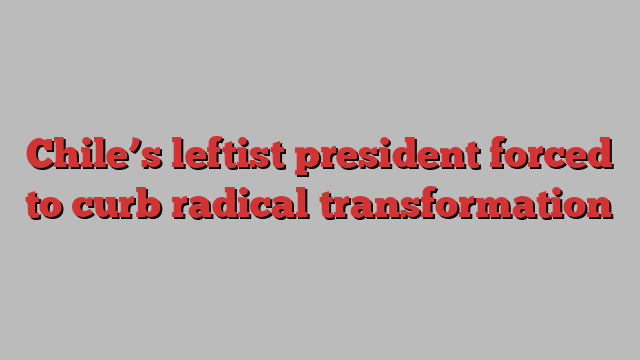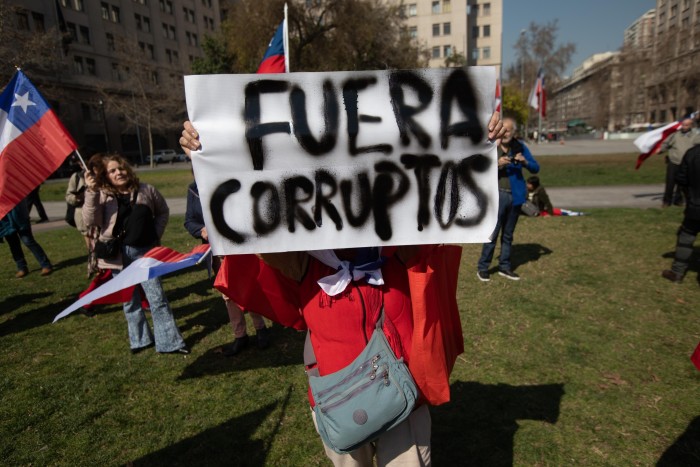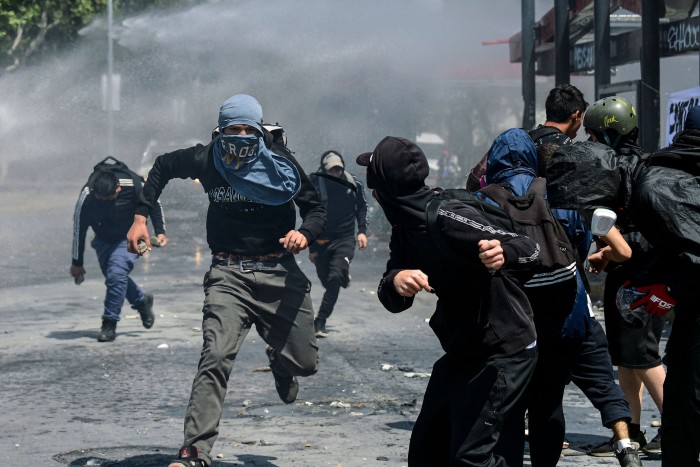
A string of legislative defeats, a corruption scandal and the worst crime wave in decades have derailed leftist Chilean president Gabriel Boric’s plans to radically transform the country, forcing an attempt to change course for his remaining two years in office.
“We have to learn to move slowly, step by step . . . or we risk falling off a cliff,” Boric said this month in a speech to the Organisation of American States, recalling advice from Jose Mujica, a former revolutionary who took a pragmatic approach as Uruguay president from 2010 to 2015.
“By wanting it all, we can end up with nothing.”
Boric, a 37-year-old former student leader, was elected in 2021 in the wake of mass protests over inequality dubbed “the social explosion”. He promised sweeping changes to the privatised services, low taxes and investor-friendly constitution that underpin the economic model Chile adopted in the 1980s under dictator Augusto Pinochet.
Eighteen months in, Boric’s core campaign pledges to scrap Chile’s private pension system and raise taxes to fund social programmes have foundered. A radical leftwing constitution was rejected by voters, who then handed Chile’s far right control of writing a replacement. The president’s approval ratings hover around 30 per cent.
Boric has banked a few policy wins, including a boost to the minimum wage and a 40 hour work week. He said on Thursday that he aims to increase public spending by 3.5 per cent in 2024. But with congress mired in polarisation, analysts said Boric risks becoming a lame duck.
Since June, Boric’s coalition has also been rocked by a corruption scandal. Regional officials are accused of awarding millions of dollars in government contracts to politically friendly NGOs without relevant expertise. One case includes a former influencer accused of spending taxpayer cash on repeated purchases of lingerie.

His government’s trajectory has disappointed leftists in Latin America, who saw in Boric — a champion of democracy and climate action — the hope of renewal for a movement still dominated by leaders who came of age during the cold war, said Michael Shifter, former president of the Inter-American Dialogue think-tank.
“People weren’t naive that it was going to be easy, but there was a sense that the torch was being passed at least in one country,” Shifter added. “A lot of eyes were on Chile, and a very appealing young leader.”
As Boric shifts to a more pragmatic approach, over three cabinet reshuffles he has sidelined ministers from his youth-led leftist coalition in favour of established figures from the centre-left Socialist party, such as interior minister Carolina Tohá.
The tax bill, already rejected once, is being split into separate parts on combating evasion and increasing levies. Rightwing leaders have vowed to block the latter.
Officials have scaled back the pension reform to a proposal similar to one that nearly passed under Boric’s rightwing predecessor, which would increase employer contributions, allocating part of the proceeds to a solidarity fund, and raise the minimum state pension.
“The government’s proposals are reformist,” Tohá told the Financial Times. “None of them are a revolution, or a violent or abrupt change in any way.”
The government hopes to present the pension bill by the end of the year, she added. “The outlook is much better than it was midway through the year, when all the doors seemed closed.”
Analysts said the deck has always been stacked against Boric’s transformative agenda. His coalition, which stretches from the centre-left to the Communist party, is difficult to corral and lacks a majority in congress. The rightwing opposition has made few legislative concessions to a government it perceives as weak.
“When a president is popular, even if he has a minority in parliament, he can find a way to build agreements,” said Javier Macaya, president of the rightwing Unión Democrática Independiente party. “Citizens have lost confidence in this government.”
In August Macaya’s party successfully pushed Boric to dismiss social development minister Giorgio Jackson, his close friend whose party has become most associated with the corruption scandal. Jackson once claimed that his political generation had a different “scale of values and principles” than earlier ones.
Patricio Navia, a political scientist and professor at New York University, argued that Boric, who was elected via a run-off vote against controversial far right leader José Antonio Kast, had misread the public’s enthusiasm for radical change after the “social explosion”.
While those protests were fuelled by the failings of the Pinochet model — a high cost of living, inadequate public services, and a failure to close the gap between rich and poor — Navia said most voters remain wary of abandoning a system that has made Chile far more stable and prosperous than its neighbours.

“Chileans were upset because the elite was keeping them out of the promised land,” he added. “Boric said, ‘I’m going to build you a new bridge to a different promised land.’ But they didn’t want that. They just wanted access to the old one.”
Gonzalo Winter, a lawmaker for Boric’s leftwing Frente Amplio party, disagreed. “Since the social explosion, the right has mobilised fiercely against the possibility of real structural changes,” he said. “If we don’t solve Chile’s structural problems, we create the conditions for a new crisis.”
Strategic errors have hurt Boric. For his first cabinet, he appointed inexperienced figures to critical roles, including a 35-year-old doctor as interior minister, who worsened tensions with indigenous Mapuche groups.
But experts said the greater drag on his popularity is a surge in crime. While still low for the region, Chile’s murder rate increased by almost 50 per cent in five years to 2022, as organised crime groups gained a foothold. A July survey by pollster CEP found that 85 per cent of Chileans consider the country’s police “overwhelmed” by crime.
Esmir Jose, a taxi driver who moved to Chile from Venezuela seven years ago, said he was planning to return to his country despite its state of economic collapse.
“When I arrived [in Chile], it felt like Europe — you could walk around with your cell phone out, no problem,” he added. “Everything is going downhill.”
Insecurity and the stalled reforms have hit economic activity, including in the crucial mining sector. Investors were also spooked by Boric’s announcement in April of a plan to semi-nationalise the lithium industry. The IMF expects Chile’s GDP to shrink by 1 per cent this year.
Shifter said Boric’s challenges offer lessons for the region’s left. “While leadership renewal is important and refreshing, it is not enough to forge a successful government,” he said. “Political skill and experience are also essential. The key is to find the right combination.”